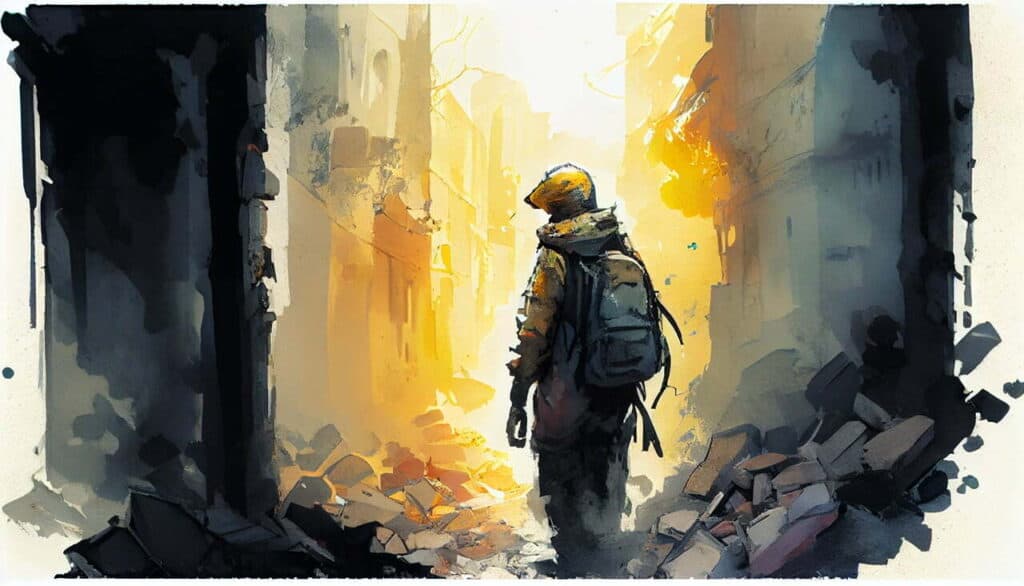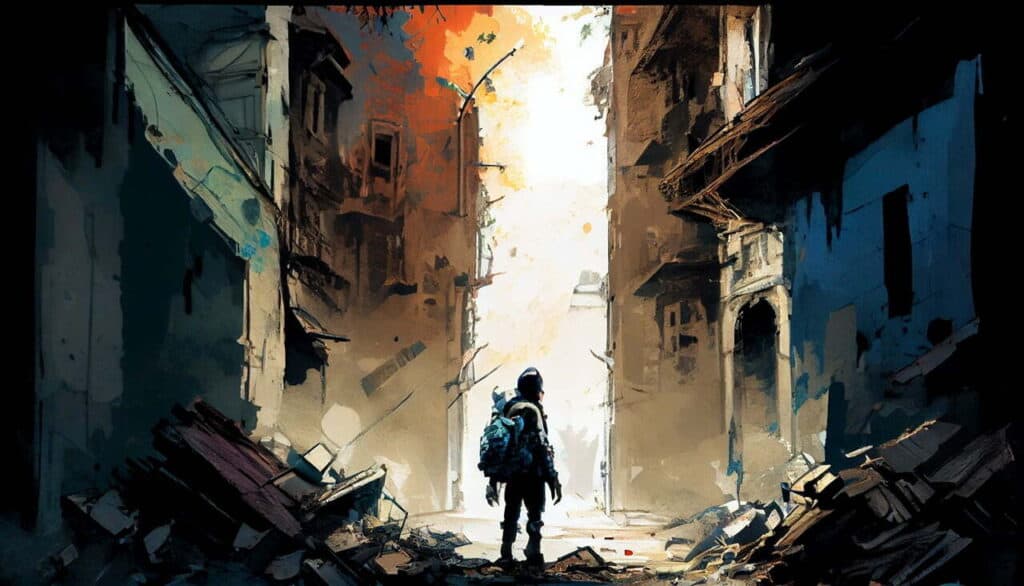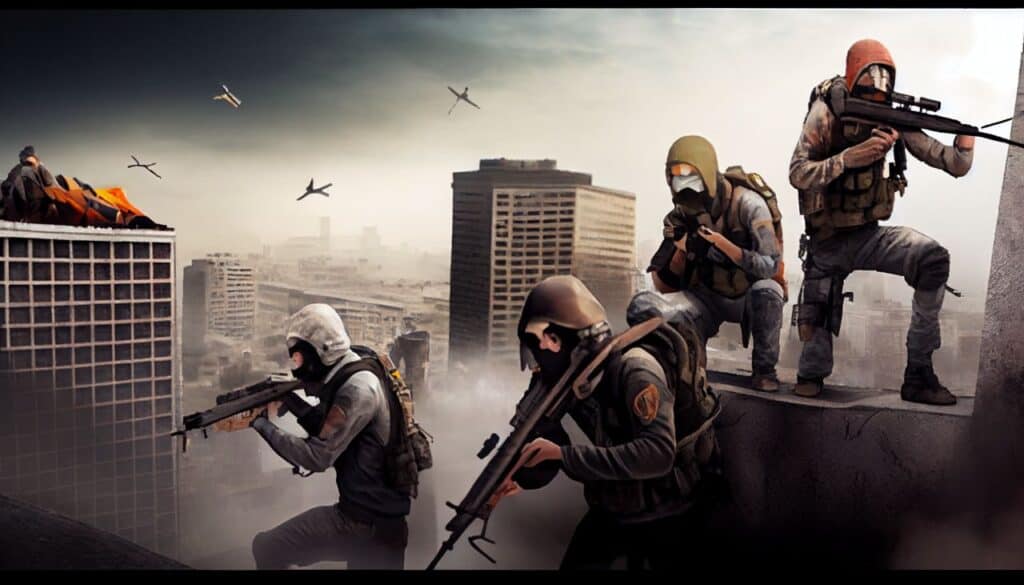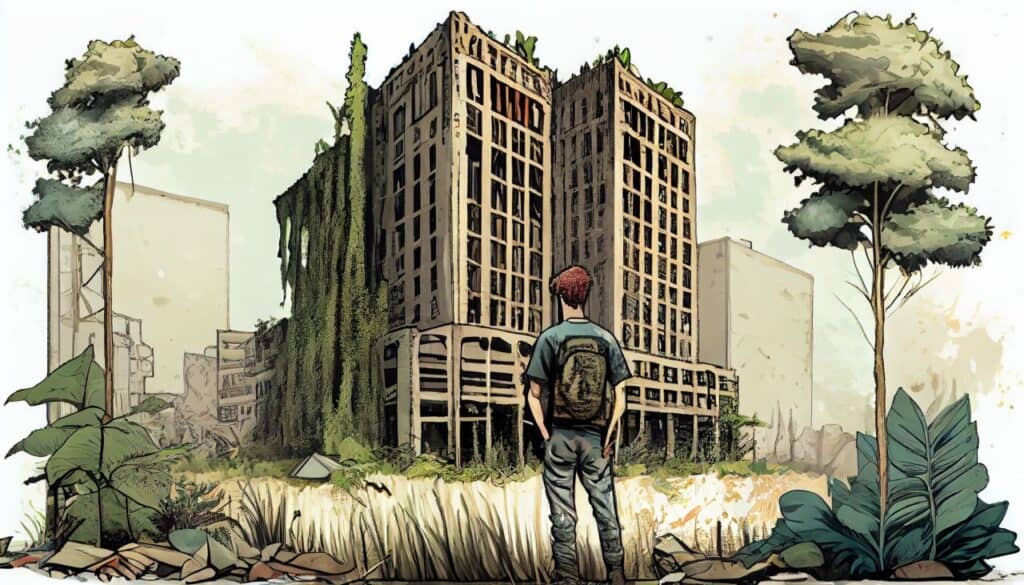With most Americans residing in bustling cities, urban survival skills have become a crucial aspect of preparedness for emergency situations and everyday life.
Mastering these essentials, such as navigation, shelter construction, water procurement, and food collection, can make all the difference when faced with unexpected challenges in an increasingly unpredictable world.
In this blog post, we delve into Urban Survival Training 101 to equip you with practical knowledge that will empower you to not only survive but thrive in any city environment.
Table of Contents
Understanding Urban Survival: Basic Skills And Essential Gear

Learn the basic skills and necessary gear for urban survival, including navigation, communication, water purification and storage, shelter building and fire starting, first aid and medical knowledge, resource management, urban foraging, self-defense, bartering, mental preparation, and emotional resilience.
Navigation And Communication Skills
Effective navigation and communication skills can mean the difference between life and death in urban survival scenarios. Navigating busy city streets, alleys, parks, and public transportation systems is crucial to ensure you can quickly move through your environment confidently while avoiding potential dangers.
Communication skills are equally important in urban environments where connections with others play a vital role in staying safe, getting assistance during emergencies, and gathering essential information.
Establishing relationships within your community enables sharing resources or knowledge about potentially unsafe areas around town. Learning how to communicate effectively using walkie-talkies or short-wave radios ensures reliable contact with loved ones if cell networks fail during disasters like hurricanes or earthquakes.
Water Purification And Storage
Navigating the concrete jungle requires mental and physical prowess and a keen understanding of essential survival skills such as water purification and storage.
As we all know, access to clean drinking water is critical for maintaining health and hydration in any situation, especially during urban disasters or emergencies when traditional sources may be compromised.
In cities, where space comes at a premium, preppers should have multiple methods of purifying water on hand – including filtration systems, chemical treatments using iodine or chlorine tablets, UV light devices like SteriPENs, and boiling.
Efficient storage solutions are vital for conserving precious resources while maximizing limited living spaces commonly found in city dwellings. Utilizing collapsible containers allows you to conveniently store large quantities of purified water without wasting valuable real estate.
Shelter Building And Fire Starting
Shelter building and fire starting are two vital skills for urban preppers, as they ensure protection from the elements and access to warmth, light, and cooking capabilities.
A well-constructed shelter can provide much-needed security when navigating unfamiliar or unstable environments within the city.
Fire starting is equally essential in an urban survival scenario. It’s not just about keeping warm; it also plays a crucial role in purifying water, cooking food, warding off potential threats, and providing a sense of comfort during trying times.
Urban preppers should familiarize themselves with various methods of ignition, such as using ferro rods or striking steel against flint – ensuring that these techniques work efficiently even in adverse conditions.
Additionally, knowing which materials are readily available within the cityscape – like cardboard or paper products – will help guarantee that you have dependable tinder sources on hand whenever needed.
First Aid And Medical Knowledge
One of the most critical skills in urban survival training is first aid and medical knowledge. In emergency situations, knowing how to treat injuries and illnesses could mean the difference between life and death.
As a prepper, it’s essential to have at least basic training on how to stop bleeding, splint fractures, perform CPR, and manage shock.
Having a well-stocked first-aid kit with items like gauze pads, bandages, and antibiotic ointment is important as well. It is also necessary to acquire medication for common health problems beforehand in case an emergency situation arises where hospitals are inaccessible.
Resource Management And Urban Foraging
Managing resources is a crucial aspect of urban survival training. It’s essential to learn how to conserve and use resources effectively in a high-stress and fast-paced environment.
Urban foraging skills are also important, as they enable you to find food or other necessary items in the city during an emergency situation when traditional sources may not be available.
To enhance your resource management skills, consider carrying a small kit with basic tools like pliers, wire cutters, duct tape, and zip ties that can come in handy for various tasks, such as repairing shelter or equipment.
Additionally, learning how to improvise new uses from everyday objects around you is also an excellent way of maximizing your resources while keeping costs low.
Self-defense And Bartering
When it comes to urban survival, self-defense is a crucial skill. In the city, one must always be aware of their surroundings and potential threats. Learning basic martial arts or carrying pepper spray can go a long way in protecting oneself from attackers.
Additionally, knowing how to barter effectively can help with resource management in emergency situations. Bartering involves trading goods or services with others without using money as currency.
For example, one could trade canned food for medical supplies or offer protection in exchange for shelter. It’s important to practice negotiation skills and have items on hand that may be valuable to others in times of scarcity.
Mental Preparation And Emotional Resilience
One of the most critical aspects of urban survival training is developing mental preparation and emotional resilience. Surviving in a city environment means dealing with high levels of stress, danger, and uncertainty on a regular basis.
To develop a strong sense of mental preparation and emotional resilience, urban preppers must learn how to manage their emotions effectively, stay calm under pressure, and maintain focus even in chaotic situations.
In addition to these individual coping skills, building a reliable support system through community building is also crucial for maintaining good mental health during emergencies.
Strong networks provide valuable information-sharing opportunities, essential goods trading systems, and an excellent source for mutual aid if you’re completing the Urban survival training DUST course by Dale Brown or participating in Detroit Urban Survival Training programs from experienced trainers like Jason Bourne.
Advanced Urban Survival Techniques

Learn how to evade danger in crowded and dangerous environments, prevent crime, and cope with natural disasters or emergencies with advanced urban survival techniques.
Evading Danger In Crowded And Dangerous Environments
When it comes to urban survival, avoiding danger is a crucial skill for preppers. In crowded and dangerous environments, this can be especially challenging. Here are some tips and techniques to help you evade danger and stay safe:
- Stay aware of your surroundings at all times, including potential escape routes or hiding places.
- Avoid drawing attention to yourself unnecessarily, such as wearing flashy clothing or carrying expensive items.
- Blend in with the local population as much as possible, whether through clothing choices or cultural knowledge.
- Be prepared to change direction quickly or take cover if necessary.
- Use distraction techniques to divert attention away from yourself and create an opportunity to escape.
- Have a plan in place for different scenarios, such as a fire or active shooter situation.
- Maintain good physical fitness and mobility so that you can quickly move out of harm’s way.
Remember, there is no guaranteed way to completely avoid danger in urban environments. However, by developing these skills and staying vigilant, you can increase your chances of staying safe in crowded and dangerous situations.
Crime Prevention Strategies
Preppers need to be aware of the high risk of crime and theft in urban environments. To avoid becoming a target, it’s important to take proactive steps to mitigate risk. Here are some crime prevention strategies:
- Avoid dangerous areas at night or when traveling alone
- Be aware of your surroundings and stay alert
- Keep a low profile, and don’t draw attention to yourself
- Secure your dwelling with strong locks and security devices
- Use a safe for valuable items and important documents
- Keep cash on hand to use as a decoy if held up
- Be cautious about who you trust with personal information
- Practice situational awareness in public places
- Consider carrying non-lethal self-defense items like pepper spray or a stun gun.
Keep in mind that these strategies are just the start; there is no substitute for being prepared for emergencies and acting quickly in difficult situations. Criminals often prey on those who seem unprepared or vulnerable, so if you’re able to show that you’re serious about taking care of yourself and your loved ones, you’ll be much less likely to become a victim of crime.
Coping With Natural Disasters Or Emergencies
Natural disasters or emergencies can be the ultimate test of urban survival skills. Here are some key strategies to help you cope:
- Stay informed: Keep up-to-date with local news and weather updates via emergency alert apps, social media, or a battery-powered radio.
- Have an emergency kit: Equip yourself with essential items like food, water, first aid supplies, a flashlight, and extra batteries in case of power outages.
- Plan for evacuation: Be prepared to leave your home quickly if necessary by having a designated meeting spot or transportation arrangement in place beforehand.
- Stay calm: Panic can lead to poor decision-making, so try to remain level-headed and focused on survival priorities.
- Avoid dangerous areas: If possible, stay away from flood-prone zones or damaged buildings after a natural disaster hits.
- Use resources wisely: ration your food and water supplies while keeping an eye out for potential sources of aid such as government relief centers or other community resources.
- Seek out help if needed: Don’t hesitate to reach out for help from first responders, friends, and neighbors during an emergency.
By following these strategies and seeking further urban survival training, you’ll be better prepared to face any future disasters that might come your way in the city environment.
Overcoming Challenges: Limited Resources And Overcrowding
Learn strategies for resourcefulness and creative problem-solving to overcome the challenges of limited resources and overcrowding, including staying safe in high-risk areas and maintaining health and hygiene in difficult circumstances.
Strategies For Resourcefulness And Creative Problem-solving
Being able to think on your feet and come up with creative solutions is essential in urban survival situations. Here are some strategies for resourcefulness and problem-solving:
- Use what you have: In a survival situation, you may not have access to all the gear or resources you need. Knowing how to improvise and use what’s available to you can make all the difference. For example, using discarded materials to build a shelter or starting a fire with natural materials instead of a lighter.
- Think outside the box: Sometimes, the most obvious solution isn’t the best one. Being willing to consider alternative approaches can help you find more effective solutions. For instance, if water sources are limited, you could consider collecting rainwater or using a solar still to purify water.
- Plan ahead: Anticipating challenges and planning for them ahead of time can prevent problems before they occur. Whether it’s storing extra supplies or knowing alternative escape routes in crowded areas, having a plan can help you stay one step ahead.
- Collaborate with others: Building strong networks and working with others can provide valuable resources and support in times of crisis. Whether it’s sharing skills or pooling resources, community building is an important aspect of urban survival training.
- Maintain a positive mindset: Staying calm and positive in stressful situations can help you think more clearly and make better decisions. Practicing mindfulness techniques or finding ways to boost your morale can be helpful strategies for maintaining emotional resilience.
Remember that resourcefulness is about being adaptable, flexible, and creative in your approach. By developing these skills, preppers can increase their chances of thriving in challenging urban environments.
Staying Safe In High-risk Areas
One of the most critical aspects of urban survival is staying safe in high-risk areas. Whether you’re navigating through a dangerous neighborhood or facing an imminent threat, being prepared and knowing how to evade danger is essential.
One useful strategy is to stay alert and aware of your surroundings at all times. This means avoiding distractions and staying present in the moment.
Another effective way to stay safe in high-risk areas is by blending in with the local culture as much as possible. This means dressing appropriately for the area you’re visiting and avoiding behavior that might make you stand out as an outsider.
According to a joint UN-HABITAT/WHO report titled “Hidden Cities,” living in high-risk areas can have serious health implications due to increased exposure to violence, pollution, and disease outbreaks.
Keeping Health And Hygiene In Difficult Circumstances
Maintaining health and hygiene in urban survival situations can be a real challenge. Without proper sanitation, we may become vulnerable to diseases that could easily spread in overcrowded areas.
However, there are a few simple steps you can take to keep yourself healthy and clean. Firstly, always purify your drinking water before consuming it by either boiling it or using purification tablets.
It’s also essential to have a well-stocked first aid kit with basic medical supplies like bandages, antiseptics, pain relievers, and other necessary medication.
Moreover, disposing of waste properly is crucial for preventing the spread of disease and contamination of water sources.
By following these hygiene practices during an urban survival situation, you will minimize the risk of getting sick while ensuring that you stay energized for whatever challenges come your way.
Community Building And Support
Building strong networks and finding like-minded individuals is crucial for urban survival; it allows for the development of mutual aid systems, sharing of resources, and learning from local experts and sources.

Building Strong Networks And Finding Like-minded Individuals
Building strong networks and finding like-minded individuals are essential components of urban survival training. In a crisis situation, it’s vital to have people who can support and help you through difficult times.
One way to build these networks is by attending workshops or training courses facilitated by experts in the field of urban survival. The Detroit Urban Survival Training (DUST) course, for instance, offers participants an opportunity to learn from experienced trainers such as Dale Brown on how to navigate various challenges that come with city living.
In addition to formal training or online forums, building successful relationships with like-minded individuals requires mutual trust and respect. One way to achieve this is by volunteering within your community or joining local organizations focused on emergency preparedness.
Learning From Local Experts And Sources
In urban survival training, it’s important to tap into the knowledge and expertise of local experts in order to navigate the unique challenges of city living. Whether learning from experienced preppers in your community or seeking tips from local law enforcement, fire departments, or emergency response teams, having access to this insider information can be invaluable for staying safe and prepared.
For example, participating in community emergency response team (CERT) training programs can help you develop critical skills such as first aid and search-and-rescue techniques alongside professionals who have honed their craft through years of experience.
Other resources might include attending seminars on self-defense at a nearby martial arts studio or accessing online forums dedicated to urban survivalists, where people share tried-and-true strategies for coping with everything from natural disasters to civil unrest.
Developing Mutual Aid Systems And Sharing Resources
Developing a strong community network can be essential in times of crisis. Here are some ways to develop mutual aid systems and share resources with other like-minded individuals:
- Join local prepper groups or start one yourself to connect with others who share your interests.
- Create a neighborhood watch program to keep an eye out for potential dangers and help each other stay safe.
- Host skill-sharing events where members of the community can teach each other valuable survival skills.
- Share surplus food, water, medical supplies, and other resources with those who might need them.
- Develop a bartering system for goods and services that might be useful in an emergency situation.
- Work together to create shared spaces for growing food, collecting rainwater, or storing emergency supplies.
Remember that building strong relationships within your community is just as important as having the necessary survival skills and resources. By working together and sharing knowledge and resources, you can increase your chances of thriving in any situation.
Planning And Preparation

Developing an emergency plan for oneself and one family, storing and managing supplies, and regular training and practice are crucial steps in preparing for urban survival.
Developing An Emergency Plan For Oneself And Family
An emergency plan is a crucial part of preparing for urban survival. Here are some steps to follow:
- Identify potential threats: Make a list of possible scenarios that may affect your area, such as natural disasters, power outages, or civil unrest.
- Establish communication: Decide on a meeting place and an out-of-state contact person in case you get separated from your family members.
- Create a shelter plan: Find safe places in and around your home where you can take cover during emergencies.
- Stock up on supplies: Keep enough food, water, medications, and other essentials to last at least 72 hours.
- Learn basic skills: Know how to perform first aid, navigate using a map and compass or GPS device, start a fire without matches, and defend yourself if necessary.
- Practice your plan: Conduct regular drills with your family to ensure everyone knows what to do in an emergency.
Developing an emergency plan and practicing it regularly can increase your chances of surviving urban disasters and staying safe in difficult circumstances. Remember that preparation is key to thriving in the city.
Storing And Managing Supplies
Preppers need to pack and store supplies to thrive in the city during a survival situation. It is essential to have the necessary resources for shelter building, water procurement, food gathering, first aid, self-defense, and more.
Managing supplies requires preppers to put in some effort, as it’s easy to forget important items or overlook their expiration dates. Learning how to organize supplies and manage inventory efficiently will save time and ensure that vital materials are accessible when required.
Keeping a well-stocked bag or kit at home – including essentials like batteries, flashlights, and radios – ensures that everyone stays prepared without having to rummage through disorganized clutter or make last-minute trips out of town if there’s an emergency.
Regular Training And Practice
It’s not enough to just learn urban survival skills once and think you’re good to go. To truly be prepared for the challenges of city living, regular training, and practice are essential.
One great way to ensure regular training is to join a local group that focuses on urban survival or emergency preparedness. These groups will often hold practice sessions or drills where you can implement your skills under safe conditions.
Additionally, setting aside time each week or month for personal practice can also be helpful.
The Importance Of Being Prepared For Urban Survival
Taking proactive steps to prepare for urban survival is crucial in ensuring one’s safety and self-sufficiency during emergency situations, as it allows individuals to face challenges with confidence and empowerment gained through training and preparation.
The Value Of Taking Proactive Steps To Stay Safe And Self-sufficient
Surviving in an urban environment can be challenging, especially when faced with natural disasters or emergencies. That’s why taking proactive steps toward staying safe and self-sufficient is essential.
Urban Survival Training 101 and other resources offer a wealth of information on the skills needed for thriving in the city. These areas require preparation and practice, from water purification to food storage and self-defense to communication skills.
Being well-equipped to navigate uncertain times ensures the safety and gives a sense of empowerment and confidence.
Taking Concrete Actions To Face Challenges And Risks In The City
As a prepper, it is essential to take proactive steps to prepare for urban survival. This involves taking concrete actions to face challenges and risks in the city head-on.
Some of these actions include learning navigation skills and developing communication strategies to stay informed during emergencies.
Additionally, resource management is crucial in urban survival training. Prepping involves stockpiling essentials such as water purification gear, food storage solutions, and shelter-building materials.
Effectively managing resources can help you stay safe in high-risk areas, keeping your health and hygiene intact even under difficult circumstances.
Gaining A Sense Of Confidence And Empowerment Through Training And Preparation.
When it comes to urban survival training, one of the most significant benefits is gaining a sense of confidence and empowerment through preparation. Knowing that you have the skills, knowledge, and resources to handle potential emergency situations gives you a sense of control over your life and surroundings.
For many preppers, this newfound confidence comes from learning essential skills such as navigation, water purification, shelter building, first aid, self-defense, and resource management.
These skills help you survive and provide a sense of self-sufficiency that can be incredibly empowering.
Ultimately, being able to face challenges with courage instead of fear is an invaluable aspect of urban survival training.
In conclusion, becoming proficient in key urban survival techniques can offer numerous benefits beyond simple preparedness- such as improved endurance, courage, and mental fortitude, which are valuable traits not just for surviving disasters but succeeding in day-to-day struggles as well!
Frequently Asked Questions (About Urban Survival Skills and Training)
What are some essential skills needed for urban survival?
Some essential skills include learning how to find and filter water, starting a fire without matches or a lighter, building shelter using readily available materials, knowing basic first aid techniques, and having knowledge of self-defense.
How can I prepare myself for unexpected situations in the city?
One way to prepare yourself is by keeping an emergency kit on hand that includes essentials such as water, non-perishable food items, a multi-tool knife or blade for cutting through debris & rope/twine/paracord, along with additional tools like flashlights or batteries.
Is it safe to use open flames in the city during emergencies?
It’s important to be aware of your surroundings when starting fires outdoors in urban areas while making sure you don’t start wildfires inadvertently causing damage close quarters. In general – small controlled burns (i.e., campfires) should be okay if appropriate precautions are taken, but large uncontrolled blazes need to be avoided at all costs, given liability concerns around damages/maintenance issues caused after incidents occur.
Are there any special considerations for surviving long-term in an urban environment?
Yes – Long-term survival may require developing more sophisticated systems, including communication mechanisms like walkie-talkies which function well despite being surrounded by concrete walls/elevated buildings obscuring signals; farming practices ideal for creating sustainable means produce fresh fruits/vegetables even under limited space constraints where tiny houses/container homes could be set up across rooftops/commercial properties, etc. Having detailed maps showing crucial routes to evacuate also proves useful. If possible, investing in solar panels/clean energy generation machinery serving power needs sustainably over time within high-density populated areas would go a long way towards ensuring comfort/safety in highly unpredictable scenarios involving weather events/power outages, etc.
Conclusion
In conclusion, urban survival training is essential to being prepared for emergencies in the city. Individuals can increase their chances of staying safe and self-sufficient during a crisis by understanding basic skills such as navigation, shelter building, water procurement, and food collection.
Advanced techniques such as crime prevention strategies and coping with natural disasters should also be considered. It is important to remember that living in an urban environment presents unique challenges that require specific preparation.
By planning ahead, building strong networks within the community, and regularly practicing survival skills, we can gain confidence and empowerment in the face of adversity.


